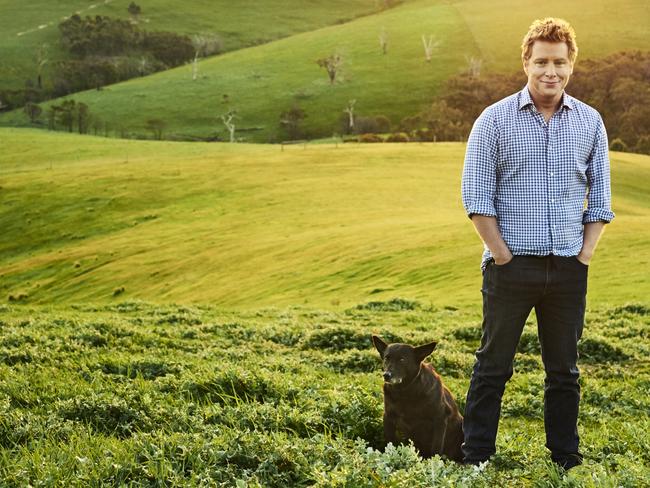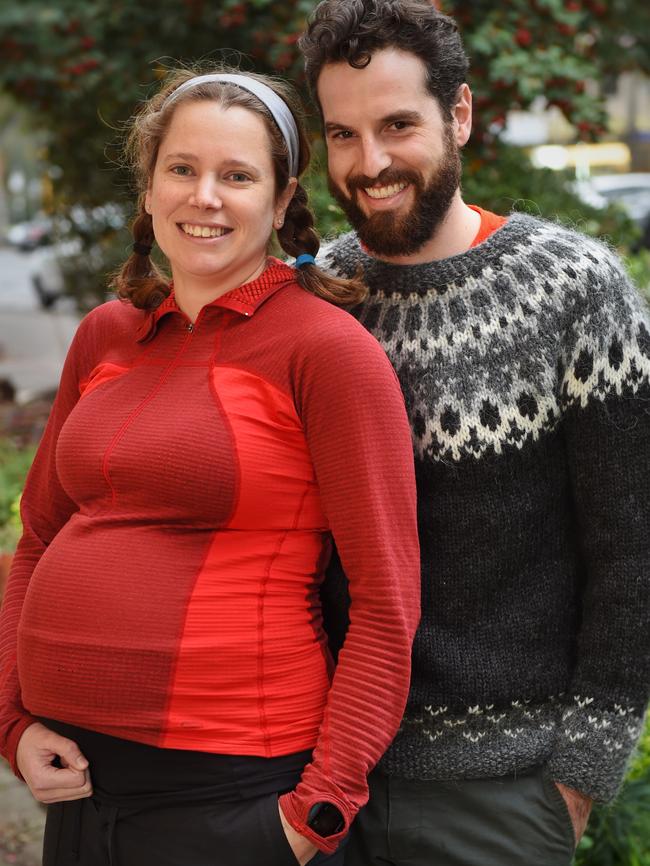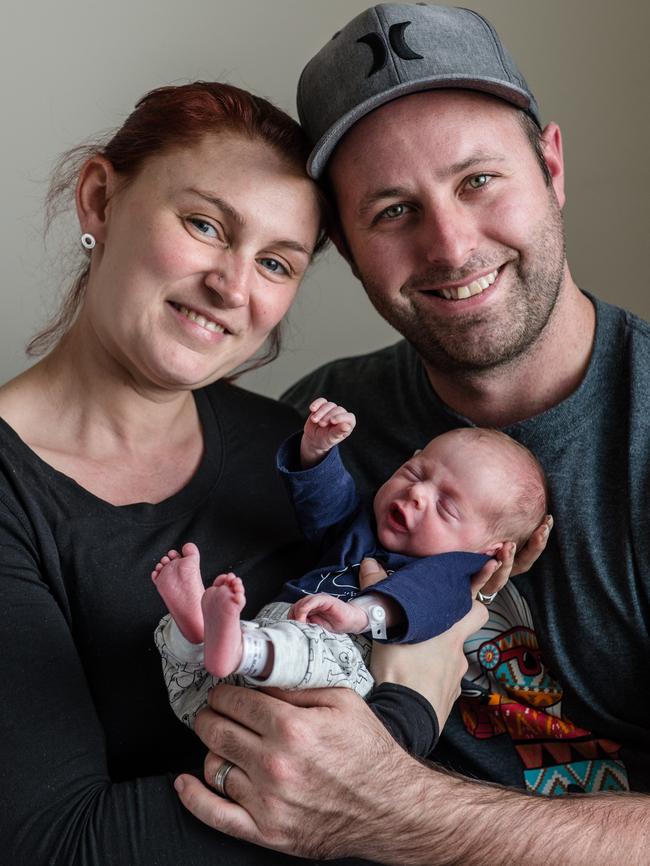Barefoot Investor: How to save for a baby without going broke
Freaked out families might be wondering what they can do to budget for a baby. Ditch tracking expenses and keep things simple, writes the Barefoot Investor.
Barefoot Investor
Don't miss out on the headlines from Barefoot Investor. Followed categories will be added to My News.
- Why young women are miserable
- How to save money and retire comfortably
- Time to teach young people about money
- Bitcoin-fever fuels digital goldmine
THESE days I’m an old hand at this baby thing … we’re currently baking our third (well, my wife is).
However, I remember going to our prenatal parenting class like it was yesterday ...
It was a Sunday morning at the hospital, and the midwife kicked off proceedings with a nice bit of chitchat.
Midwife: “How many hours did you sleep last night?”
Barefoot: “Err, I guess I got maybe eight.’’
She turned her back and scribbled ‘8’ on the whiteboard.
“And how many hours did you spend socialising last night?’’ she asked another dad-to-be, who looks a little dusty. (My guess — too many).
Over the next 10 minutes she asked soon-to-be parents more questions and scribbled more numbers on the whiteboard: hours for sleeping, hours for socialising, hours for eating, hours for exercising, hours for watching TV.

When she was finished, she stood silently staring at the numbers on the whiteboard.
Then she turned and pounced on her class of well-slept parents-to-be.
“YOU HAVE NO IDEA WHAT YOU ARE IN FOR,’’ she thundered.
Then she got a red marker and struck a line through my eight hours of sleep on the whiteboard: “that’s gone”.
She continued, striking off socialising, TV, and (rather alarmingly), the two hours most of us spend eating each day.
You know what? She was totally right.
However, the real wakeup that many new parents need is understanding just how expensive starting a family is. So, let me get my whiteboard out, and take my place at the front of the class.
Read more Barefoot Investor: Talking dollars and sense with Prime Minister Malcolm Turnbull
WHAT SHOULD YOU EXPECT FINANCIALLY WHEN YOU’RE EXPECTING?
Well, according to Suncorp, the average Australian parent spends more than $297,600 raising a child to the age of 17 and it costs $984 per month for the first two years of your child’s life.
Ouch.
With those sort of numbers, freaked out families might be wondering what they can do to budget for a baby.
The truth? I’ve never been able to stick to something as rigid as a budget, and I don’t expect you to either.
Look, I’ve helped thousands of people with their money and I can tell you that the conventional wisdom espoused by finance experts — ‘Get on a budget! Track your spending’ — is dead wrong.
Using willpower to force yourself to stick to a rigid budget, day in day out, just doesn’t work.
In fact, it’s the opposite.
If you really want to win, you should ditch tracking everything and instead, keep things simple.
Six simple steps to ruin your financial life

COUPLES WHO BANK TOGETHER, STAY TOGETHER
According to Relationships Australia, the number-one cause of breakups is fighting about money.
If you’re married you should share the same bank account — and the financial decisions that go with it. How do you get your partner on board? Well, money talk goes better with garlic bread and wine!
Schedule monthly date nights devoted to making money decisions together so that you can make regular progress and stay on the same page.
SET UP YOUR MONEY BUCKETS
As I’ve said, budgets suck. Instead, you should simplify things and focus on three money ‘buckets’: Blow (your spending), Grow (your long-term investing) and Mojo (your emergency savings).
The deal with the Blow Bucket is spending more money on the stuff you love and less on the stuff you don’t. Better yet, I want you to actually allocate some of your pay packet to guilt-free splurges for stuff that’ll put a smile on your dial.
Here’s how to set up your blow bucket. Whip out your phone and apply for:
— 2 × everyday transaction accounts — call them ‘Daily Expenses’ and ‘Splurge’ and get a fee-free ATM card for each (it’s easier if you get your ‘Daily Expenses’ card first, then simply open another account for ‘Splurge’).
— 2 × online savings accounts — call them ‘Smile’ and ‘Fire Extinguisher’ and link them both to ‘Daily Expenses’.
Then, calculate 60 per cent of your take home pay and keep this in your ‘Daily Expenses’ account.
This is how much you should be spending on bare bones living expenses (think mortgage/ rent, groceries and bills). If it’s more than 60 per cent, look at ways to cut costs.

PUT YOUR MONEY ON AUTOPILOT
Next, I want you to put your money on autopilot so you’ll never have to worry about it again.
Set up an automatic transfer of 10 per cent of your take home pay from your ‘Daily Expenses’ account to your ‘Splurge’ account (for short-term splurges like shoes, booze and lattes).
Then, set up an automatic transfer of 10 per cent of your take home pay from your ‘Daily Expenses’ to your ‘Smile’ account (for longer-term splurges like weddings and holidays), and 20 per cent to your ‘Fire Extinguisher’ account for fighting financial fires (think paying off credit card debt, saving for a home deposit, or topping up your Mojo — see below).
MOJO, BABY
Finally, you should have one bank account completely separate from your day-to-day banking.
I’m talking another financial institution altogether.
Why?
Because I want to make it hard-ish to get at this money. This account will become what I call your ‘Mojo Money’.
The aim of the Mojo account is to get your Mojo back, baby. So you don’t have to stress about money like everyone else.
So what is it? Well, it’s not an offset account. It’s not a redraw facility. It’s not shares. It’s cold, hard cash in the bank.
I deliberately keep it separate from my day-to-day banking, because I don’t want to be tempted to spend it. It’s for emergencies like, say, your house burning down. And it’s a good feeling knowing that you have a separate pot of money that can be your ‘get out of jail free’ card when you need it.

When you open your separate Mojo account, set it up with an initial $2000 deposit (eventually, build it up to three months of living expenses). And if you don’t have a spare $2000, look around your house and see what you can flog on Gumtree.
I’m dead serious.
A survey by comparison site Finder.com found that 30 per cent of Aussies have less than $1000 available to deal with an emergency.
Stressful? You don’t know the half of it.
Professor Bob Cummins and his researchers from Deakin University found that financial stress produces feelings similar to physical torture. (I would have loved to be a participant in Bob’s experiment: ‘Savings or an electric shock? You decide.’)
My direct experience of advising thousands of people over many years has left me in no doubt about the life-changing benefits of Mojo.
So, if you do just one thing to prepare financially for becoming a family, make it your mission to get $2000 in Mojo. It’s a great kick-off for what will become the most psychologically important account you ever create.
Because when you have Mojo, you don’t have financial emergencies.
COUPLES MAKE READY TO PAY ON DELIVERY
SOON-to-be parents Sam Cowie and Emily Frain have been budgeting for a child for years.
Though the expense of raising a family is daunting, the North Melbourne couple are ready for it.
They have been putting money aside and are well stocked with hand-me-downs.
“We try not to accumulate unnecessary things and have been getting a lot of second-hand items from friends or on Gumtree,” Mr Cowie said.
They were in a “good position” to grow their family, but would look to shave costs where they could.
Time to teach young the basics about saving and investing
How to get hired: Barefoot Investor's advice for job seekers
What to do when your partner spends too much


“We have a bit in savings to take care of anything unexpected that may crop up,” he said. “But it’s hard to know what that might be.
“We are trying to reduce costs by using cloth nappies, and got things like clothes and a car capsule from friends.”
Mr Cowie said they allowed themselves $150 each in personal spending per week to keep costs low.
The couple are expecting a baby boy in early September.
Mount Martha couple Hamish and Kate Wilson have already felt a hit to the hip pocket just two weeks after welcoming their first baby, Beauden, into the world.
“We’ve had final bills of the obstetrician come in and had to increase our house insurance to a family cover,” Mr Wilson, 31, said.
But they said it was all worth it.
“We knew having a baby would be costly, especially dropping back to one income, so we tried to save wherever we could,” the sales manager said.
“We did downsize our mortgage in preparation as we had a big house with a pool and knew we wouldn’t have time to maintain it with a baby.
“My wife’s also pretty good at finding a deal, so we’ve always looked for (what we’ve needed) when things are on sale.”
— What you’ve just read is an excerpt from Scott Pape’s best-selling book, The Barefoot Investor: The Only Money Guide You’ll Ever Need.
It’s sold 355,000 copies so far and the 2017 updated edition is available now, just in time for Father’s Day. Buy it for the dad in your life at the Herald Sun shop.


